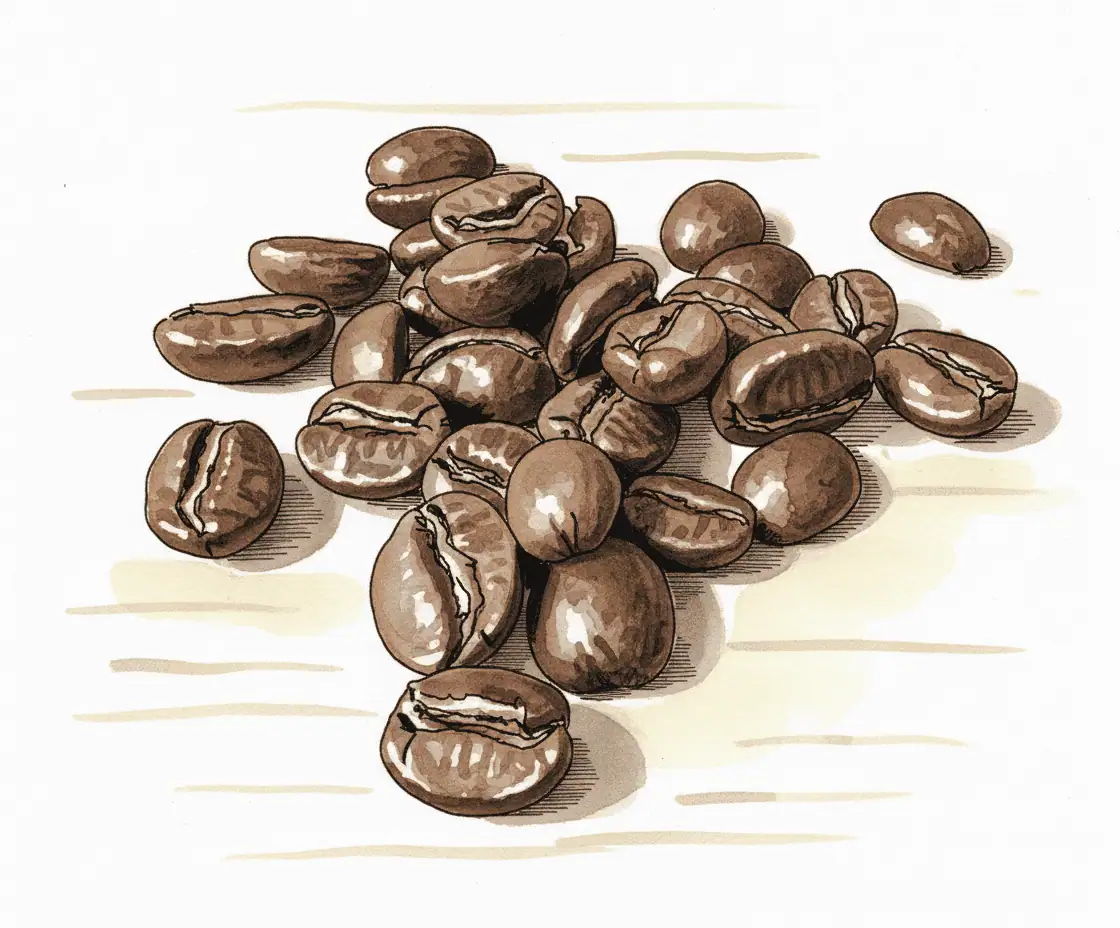High-Altitude Coffee
At high altitudes (above 1500 meters), coffee cherries ripen more slowly, resulting in denser beans with pronounced aromas. The lower temperature and thinner air foster a complex flavor profile, often characterized by high acidity and fruity, floral, or wine-like notes. Regions such as Ethiopia and parts of Latin America are known for their high-altitude coffees, which are prized for their refined and sparkling character.
High‑altitude coffee beans

colombia – la piragua
White Label Coffee presenteert Colombia La Piragua Pink Bourbon uit Palestina, Huila. Op 1800 meter groeit deze variëteit op vulkanische bodems. De oogst 2025 is gewassen, wat zorgt voor helderheid, hoge frisheid en een lange, schone afdronk. Verwacht lychee, stracciatella en citroenzest, met een florale neus en een strakke structuur. Dit microlot is kleinschalig en…

Colombia – Las Flores, Java
Deze microlot komt van Las Flores in Acevedo Huila. Blommers brandde de Java licht voor maximale helderheid. De bonen kregen een thermal shock washed proces dat aroma en zoetheid aanscherpt. Verwacht een sappige kop met lychee meloen en een zachte kruidige lift van tijm. De aciditeit blijft fris, de body zijdeachtig.Ideaal voor filtermethoden V60 Kalita…

Colombia – Popayán Sugar Cane Decaf
Deze decaf uit Popayán in Cauca levert een schone, zoete kop met ronde zuren. Stooker kiest basislots met hoge body, zodat suikerriet EA decaf de zoetheid bewaart. Verwacht warme specerijen, gedroogd fruit en een soepele textuur. Ideaal voor een avond V60 of een milde espresso.Herkomst Colombia, Popayán, circa 1700 meterVariëteiten Colombia, Caturra, CastilloVerwerking gewassen, daarna…

Colombia – San Sebastian
Colombia San Sebastian van Five Ways komt uit La Plata in Huila. De gewassen verwerking laat het terroir helder spreken. De variëteiten Castillo, Caturra en Colombia leveren balans en zoetheid. Five Ways brandt op een Loring voor een schone, levendige espresso die ook in melk standhoudt. In de kop proef je molasse, framboos en zoete…

Colombia – El Caney – Decaf
De El Caney Decaf uit Colombia is een uitzonderlijke cafeïnevrije koffie die rijk is aan zoetheid en fruitige tonen van mango en steenvruchten. Deze koffie, afkomstig van de boerderij van Gustavo Zuluaga in Risaralda, wordt gewassen en deels natuurlijk verwerkt, wat zorgt voor een complex smaakprofiel. Het decafeïneringsproces met water-EA behoudt de rijke aroma’s, terwijl…

Colombia – Las Perlitas
Colombia Las Perlitas comes from the hills of Huila, where smallholders combine their best microlots into a consistent, high-quality lot. Branderij Luijendijk roasts light to preserve the floral and fruity character. Expect a sweet aroma of honey and tropical fruit, with flavors of raspberry and orange, sometimes apricot, cherry, and plum. The bean…

Colombia – Los Osos
Colombia Los Osos is een single origin uit Huila, geteeld rond Parque Nacional Nevado del Huila. De koffie wordt gewassen verwerkt en medium gebrand, met een balans tussen body en helderheid. Verwacht zoete tonen van melkchocolade, rode bessen en een vleugje sinaasappelzest. De variëteiten Caturra en Typica zorgen voor finesse en zoetheid. Geschikt voor espresso…

Colombia – Rafael Rojas
Deze Colombia Rafael Rojas uit Paicol Huila is een microlot met Anaerobic Honey verwerking. Verwacht helder rood fruit, florale geuren en cacao in de afdronk. De lichte branding laat het zoet en de frisse zuren schitteren. De SCA score is 87, wat de consistente kwaliteit bevestigt. Transparantie in herkomst en direct trade maken dit lot…

Colombia | El Bombo
Deze single origin van Henry’s Coffee komt uit Pitalito, Huila. El Bombo is geproduceerd door Asobombo, een vrouwengroep, met een fully washed proces. Verwacht helder rood fruit, frisse appel en een romige chocoladebody met lange, schone afdronk. De branding werkt voor filter en moderne espresso, specifieke recepten vermeldt de brander niet. De SCA score is…

Colombia Algeceria Santa Barbara
Colombia Santa Barbara uit Huila is een anaerobic natural Castillo van hoge hoogte, rond 2050 meter. De koffie biedt een rijk en complex profiel met jammy bramen, vijg, donkere fruittonen in portwijnstijl, heldere florale nuances en een zachte rietsuikerzoetheid. Bessen worden handgeplukt en zonder zuurstof gefermenteerd, daarna langzaam gedroogd voor maximaal aroma en balans. Dit…

Colombia Argote Asencio Munoz
Deze single farmer Bourbon komt uit Génova Colón Nariño op vulkanische bodem. De hoogte en het koele microklimaat geven helderheid en zoetheid. De Koepoort brandt medium voor balans en een schone expressie. Het gewassen proces levert levendige zuren en een zijdezacht mondgevoel.Smaakprofiel:CitroenRode appelZwarte theeHoningSCA score 85,5 bevestigt de specialty kwaliteit. Direct Trade via Argote ondersteunt…

Colombia biologisch
Deze biologische single origin uit Colombia groeit op 1500 meter in de Andes. Kleine zelfstandige boeren plukken alleen rijpe bessen en drogen ze in de zon. Roemar brandt in kleine batches voor maximale versheid en een gebalanceerd roastprofiel. De smaak is vol en rond, met lichte zoetheid, rijke zuren en aanhoudende chocoladetonen. Dankzij de balans…

Colombia Decaf
Colombia Decaf van Ief en Ido Koffiebranderij laat zien hoe decaf levendig kan smaken. De bonen komen uit Colombia via Forest Coffee, met washed verwerking en EA Sugarcane decaf. De medium branding richt zich op sweet and creamy, met duidelijke caramel, perzik en notige tonen. De kop blijft helder en rond, met middelmatige aciditeit en…

Colombia Diego Horta Pink Bourbon
Deze gewassen Pink Bourbon van Diego Horta uit Huila blinkt uit in helderheid en zoetheid. Verwacht een frisse, sappige kop met tonen van kardemom, gele pruim, ananas uit blik en een subtiele cola-tint. Friedhats brandt dit lot als espresso roast voor hoge extracteerbaarheid, zonder het speelse karakter te verliezen. Wie liever filter zet, vindt een…

Colombia El Bombo
Colombia El Bombo van Moto Coffee komt uit Pitalito in Huila. Vijftien vrouwelijke boeren van Asobombo telen deze single origin biologisch en zorgvuldig. De fully washed verwerking en de hoogte leveren een schone kop met duidelijke zoetheid. Verwacht pure chocolade, een volle body en lichte steenfruitaccenten. De brander ontwikkelde dit profiel voor een rijke espresso…

Colombia El Mirador
Evermore presenteert Colombia El Mirador uit Huila Pitalito. Dit single-lot komt van San Agustin op 1.700 meter. Caturra, klassiek gewassen, levert een schone, heldere kop met sappige body en levendige zuren. Verwacht bosbes, sterfruit en rozijn. De SCA-score is 85,75 en onderstreept de specialty-kwaliteit.Herkomst Huila Pitalito San AgustinVariëteit Caturra 100 procent ArabicaVerwerking klassiek gewassenSmaak bosbes…
High Altitude (above 1500 meters)
Welcome to the world of high-altitude coffee! When you think of beans grown above 1500 meters, words like “refined,” “complex,” and “vibrant” often come to mind. But why exactly? In this article, we’ll dive into the effects of high altitudes on your espresso, the chemical composition of the beans, processing methods, and much more.
How altitude affects espresso flavor
At high altitudes, coffee cherries mature more slowly. This gradual ripening process allows sugars and acids in the fruit to develop over time, giving the beans ample opportunity to build a full range of flavors. When you use these beans for espresso, you’ll often taste a refined acidity and floral or fruity characteristics—think subtle citrus or berry aromas with a bright, almost “sparkling” quality. If you enjoy a delicate espresso, high-altitude beans are an excellent choice.
Chemical composition: density, sugars, and acids
Because the air is thinner and cooler at higher elevations, coffee trees receive less oxygen and grow at a slower pace. This results in denser beans that often exhibit higher acidity. The sugars develop more gradually, and the extended ripening contributes to a complex flavor structure. You end up with a bean that balances sweetness and complexity, translating into a lively cup of coffee. The increased density also impacts roasting profiles: roasters usually take extra care to highlight all those nuanced flavors.
Processing methods at high altitude
Thanks to the cooler, sometimes more humid climate, some coffee farmers opt for processing techniques that emphasize their beans’ unique characteristics. In many high-altitude regions, the washed method is especially popular, as it accentuates fruity and floral notes. Removing the pulp and mucilage under carefully controlled conditions allows any impurities to wash away, leaving a clean, pure flavor. There’s also some experimentation with natural and honey processes in these regions, though washed processing is often the standard for maintaining clarity.
Climate and microclimate
High-altitude environments have unique weather conditions: cooler nights, milder days, and often more rainfall. In some places, mist clings to the mountainsides, creating microclimates that can vary even from one slope to the next. This contributes to the slow ripening of cherries and the development of complex aromas. On the flip side, coffee farmers face challenges like fungal diseases in damp conditions, but the reward is a flavor profile cherished worldwide.
Yield and resilience
Growing coffee at 1500 meters or higher isn’t easy. The trees often produce fewer cherries because the plants expend more energy just to survive in cooler temperatures. Still, the beans command a premium for their pronounced quality and distinctive taste. Many farmers form cooperatives to share knowledge about cultivating coffee under these challenging conditions, employing innovative irrigation methods or using shade trees to protect their coffee plants.
Choosing coffee varieties
Not all coffee plants thrive at 2000 meters. Farmers often select varieties that can handle the cold and resist diseases, such as certain Arabica strains (like Bourbon, Typica, or Geisha). These varieties are known for their potential to develop subtle flavor nuances—a perfect match for the special circumstances high altitudes provide.
All in all, coffee from high altitudes isn’t just any cup of joe. Expect floral notes, a lively acidity, and refined aromas that will delight anyone seeking a bright and complex coffee experience.
